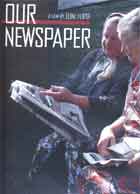
Our Newspaper 2011
Distributed by Icarus Films, 32 Court St., 21st Floor, Brooklyn, NY 11201; 800-876-1710
Produced by Eline Flipse
Directed by Eline Flipse
DVD, color, 58 min.
College - General Adult
Post-Soviet Russia, Journalism, Russian Politics, Censorship
Date Entered: 10/11/2012
Reviewed by Andrew Jenks, California State University, Long BeachPost-Soviet Russia has consistently ranked among the most dangerous places to practice the profession of journalism. As this documentary makes clear, old Soviet attitudes to the press are very much alive. Under Putin authorities have reined in press freedoms and established control over broad sectors of the media business.
Still, the independent media, while under fire, has not disappeared completely. This documentary—one of many recent excellent documentaries about Russia from Dutch documentary filmmakers—tells the tale of a married couple who engage in the Russian equivalent of tilting at windmills: starting a newspaper 550 miles north of Moscow in the homeland of the Russian Revolutionary leader Vladimir Lenin. At the time of filming in 2010 the newspaper was one of the few remaining independent provincial newspapers in all of Russia. Attempting to report the news as they saw it, the editors confronted not only the hostile authorities but widespread apathy and cynicism from their potential market of readers. Against all odds they seemed to have succeeded—publishing horoscopes and other such fluff, a kind of pablum into which the editors slipped in news that took on the powers that be.
The founder had first worked for the state-controlled “Leninist” newspaper. Tired of writing Soviet-style fare, he left to start his own newspaper, entitled simply “Our Newspaper.” It is ironic, of course, that Lenin himself had used his own newspaper to spark a Revolution (his newspaper was called “The Spark”)—and once having gained power promptly prevented anyone from using journalism to support anything but the official party line. It is against that Leninist legacy that the couple has waged their battle. In addition to discussing the challenges of “Our Newspaper,” the documentary conveys the isolation and remoteness of the place—frozen both metaphorically in Soviet time and literally in Russia’s far north. It is a window into Russian provincial life in the 21st century—such a contrast to the wealthy cosmopolitan centers of Moscow and St. Petersburg. The method in the documentary is to follow the husband and wife team on their rounds collecting the news. Along the way film makers meet a cast of oddball characters of the sort that seem to populate rural places around the world. There is the story about a wolf in a cage that no one wants to talk about—or of the middle-aged woman with a stethoscope who provides folk remedies to the locals. She provides advice to readers on a range of topics. The remedies usually feature garlic used in a variety of ways—for example, to reduce belly flab after pregnancy, a young mother is urged to mix saliva with garlic and rub it in her belly button. To loosen tongues the editors sometimes ply interview subjects with some vodka. And then the complaints flow forth—like mushrooms multiplying after the rains.
The contrast between the newspaper and its state-run counterpart is brought out by interviews with both editors. The editor of “The Leninist” sees his mission as reminding readers of the things about which they should be proud and to inform them about the activities of the government, whose officials have the final say on editorial matters. He sits in an office with a portrait of Lenin (and not Putin) over his desk.
That “Our Newspaper” could exist is a testimonial to the profound changes in Russia since the collapse of the Soviet Union. But those gains are precarious – as the editor admitted. They could be shut down at any time, so he had to be careful, as he put it, about “filtering” the news. It was a delicate balancing act involving self-censorship and measured doses of critical reporting.
Those who see glasses half full may view the documentary as a heartening example of the real democratic transformations Russian has undergone; the half-empty-glass types will lament the passing of Russia’s brief experiment with glasnost’ (the Russian word for openness and the policy allowing greater press freedoms initiated in the late 1980s by Mikhail Gorbachev even before the Soviet Union collapsed).